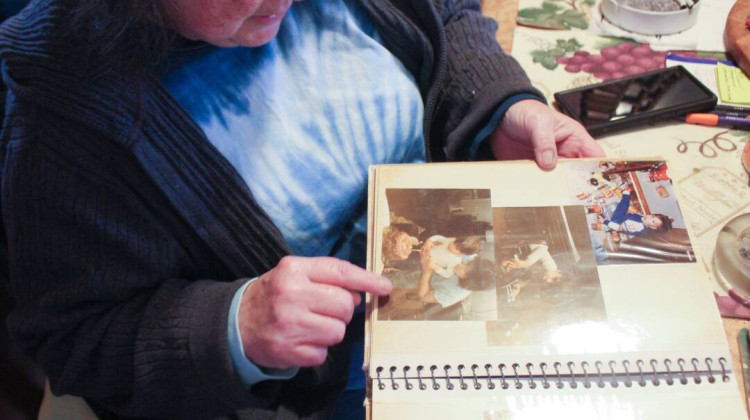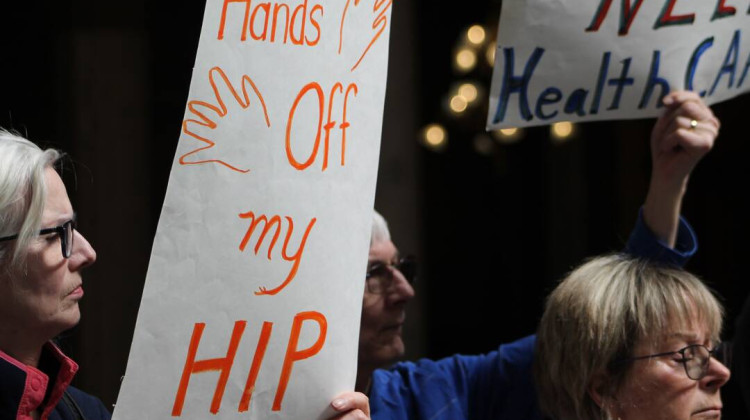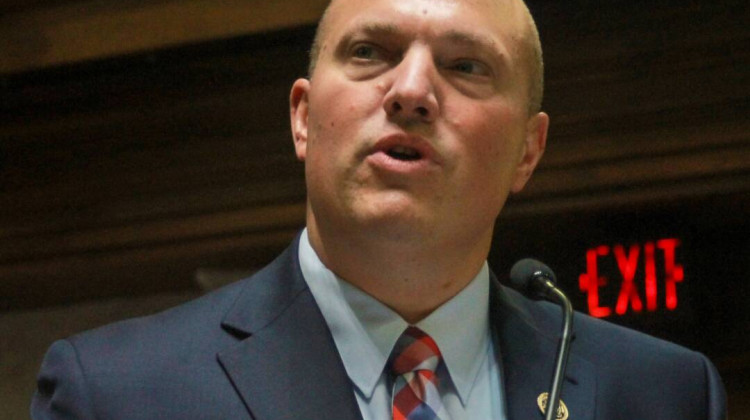The Indiana State Department of Health reported 40 additional confirmed deaths since Tuesday, bringing the state’s total to 2,198. The state announced more than 38,000 total confirmed cases, with more than 327,000 Hoosiers tested.
Indiana Entering Next Reopening Stage Friday, Two Days Ahead Of Schedule
Indiana will enter the next stage of its reopening plan Friday, June 12, a couple days early.
Stage 4 of the “Back on Track” plan allows groups of up to 250 people to gather. Retail stores no longer have capacity limits, though the state still urges proper social distancing.
Gov. Eric Holcomb says some locations will now get their first opportunity to reopen to the public since the pandemic began.
“Cultural and entertainment tourism sites such as museums and zoos and aquariums are all up to 50 percent of capacity," Holcomb says. "Movie theaters, bowling alleys open at 50 percent.”
Indiana Requires ‘High Risk’ Prison Employees To Keep Working Amid COVID-19 Crisis
An Indiana Department of Correction policy may increase the spread of coronavirus in prisons by requiring “high risk” and “medium risk” staffers to report to work.
According to internal documents, Indiana broke with the Centers for Disease Control and Prevention’s guidance for prisons, which says that staff should self-quarantine for 14 days after close contact with an infected person. By mid-April, the state required prison employees without symptoms to come to work — even if they live with someone who tests positive for COVID-19.
Health experts say the policy could allow staff to introduce the virus into prisons, which are especially vulnerable to disease outbreaks.
“It’s very dangerous,” says Leonard Rubenstein, a Johns Hopkins University professor who researches human rights and public health. “Enabling someone to come in when there's a high risk of contagion from that person is, to me, irresponsible.”
Housing Advocates Call For Rental Help Ahead Of 'Eviction Cliff'
Indiana housing advocates say the Hoosier State faces a rental housing crisis with its eviction moratorium set to expire at the end of the month.
Those advocates argue the state needs a detailed plan and an extension of the moratorium.
They say many Hoosiers are still without help to pay their rent amid the COVID-19 crisis. Indiana 2-1-1 reports housing is now its top request for referrals and unmet needs. And new census data suggests black Hoosiers were three times more likely to be unable to pay May’s rent than white Hoosiers.
“Being evicted come July 1 will only further escalate the division, the trauma and violence within our communities,” says Dee Ross, Indianapolis Tenants Rights Union founder.
Join the conversation and sign up for the Indiana 2020 Two-Way. Text "elections" to 73224. Your comments and questions in response to our weekly text help us find the answers you need on COVID-19 and the 2020 election.
Indiana Aims To Double COVID-19 Testing Capacity Through New Lab Network
Indiana hopes to at least double its COVID-19 testing capacity in the next month through a new partnership between the state, Eli Lilly and the Indiana Hospital Association.
Lilly, the state and the IHA formed a lab network across Indiana, initially comprised of 10 facilities (including the Indiana State Department of Health’s). Health Commissioner Dr. Kris Box says those labs are already running COVID-19 tests, but their capacity is restricted because of limited supplies of reagents and equipment.
“The network will leverage the state’s buying power to more efficiently compete for supplies, equipment and for reagents with both the national and international manufacturers of those items,” Box says.
Box says to launch the network, the state bought $60 million worth of testing reagents. Participating labs will then purchase the supplies from the state.
Joint Information Center Says All 500 Contact Tracing Positions Filled
The Indiana State Health Department contracted the Virginia-based company, Maximus, to hire and train 500 contact tracers. The contract will cost about $43 million a year, which includes the call center and other technology.
The ISDH’s press contact for information about the pandemic response, the Joint Information Center, said in an email all 500 positions have since been filled and declined a request for an interview.
The State Health Commissioner Dr. Kris Box says the priority was to fill these positions with people who had health administration backgrounds.
In Elkhart County, No Plans For A Face Mask Mandate Or A Delay For Reopening
As of Thursday, Elkhart County has no plans to implement a face mask mandate or hold the County back from entering the next stage of Gov. Eric Holcomb’s “Back On Track” plan.
Elkhart County saw a 350 percent increase in positive COVID-19 cases in the month of May.
County officials asked state officials if Elkhart should hold off for a week before moving into stage 4 to get a better grasp of the rising case numbers.
Elkhart County Commissioner Mike Yoder says state officials gave the OK for Elkhart to move into stage 4, which allows for larger group gatherings.
“The state looked at the data and said that no, they don’t feel like holding Elkhart County back was warranted,” he says.
Yoder says there are also no plans for an order requiring people to wear face masks, but he says the Health Department plans to put out a directive outlining when masks should be used and when they aren’t needed.
Language Barrier Hinders COVID-19 Response At Meat Processing Plants
Glenda Cervantes’s work at the Saline County Health Department usually involves helping people see if they qualify for social services. But for the last two months she’s been responding to the local COVID-19 outbreak instead. “I still remember the day they said we got our first positive and we’re going to need someone’s help," she says.
The county has one of the highest COVID-19 rates in Missouri. That’s due in part to big meat processing plants in Marshall, the county seat. More than 250 people in the county have tested positive, and two have died.
Recently, Cervantes has been doing contact tracing; calling people who have tested positive and anyone they’ve come into contact with. Because she lacks a medical background, she’s been learning on the job and at times it’s been overwhelming.
“It got to the point where we couldn’t even use our lines anymore, so we started using our cell phones so I tell the nurses now, everybody in the county has my phone number now," she says.
Contact Lauren at lchapman@wfyi.org or follow her on Twitter at @laurenechapman_.
 DONATE
DONATE







 Support WFYI. We can't do it without you.
Support WFYI. We can't do it without you.